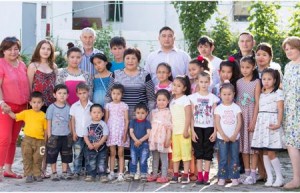 TALGAR – Spouses Tuyak Yeskozhina and Anuarbek Baissarin have raised more than 340 orphaned children left without parental care. Theirs is the largest family, not only in Almaty region, but also throughout the country.
TALGAR – Spouses Tuyak Yeskozhina and Anuarbek Baissarin have raised more than 340 orphaned children left without parental care. Theirs is the largest family, not only in Almaty region, but also throughout the country.
Nur, a family-type orphanage opened in 1998 and Yeskozhina, its permanent director, tries to respond to every child’s outcry for help. It all started one day when she met a neglected seven-year-old girl at an Almaty bazaar. The kind woman’s heart went out to the miserable and abandoned girl and after talking with her husband and grown sons, she brought the child to their home. Over the years, more kids kept coming to the Baissarin’s household; some came themselves, others were left on the doorstep by their mothers. Yeskozhina mothered and sheltered them all.
When their standard three-room flat became too small for the growing family she applied to the town administration, which gave them an old kindergarten building. The Baissarins, who have raised their own three sons, thereafter sold their Almaty apartment. With that money they revamped the abandoned kindergarten and opened one of the first family-type children’s homes in the country.
Nur looks like a big ant hill. Children are everywhere. Some are painting, dancing and singing in the game room, others are doing their homework in the classroom. To them the Baissarins are guardians de jure and parents in fact and they call them mama and papa.
Yeskozhina’s pre-retirement teaching experience at a kindergarten and school came in handy. But it’s hard to imagine what a heavy burden this woman and her husband have shouldered by deciding to shelter and parent the orphaned kids. Of course, every parent loves his or her children, but few can bring themselves to take other children into their family, take responsibility for their lives and bring them up as decent citizens. It takes enormous strength, warmth of heart and boundless patience to raise more than a hundred children of different ages and characters.
Thinking back on the financial, personal and psychological challenges they were first facing, the retired couple say the most difficult thing was to break the children’s bad habits and ragamuffin ways picked up in the street. The children came to them mostly unkempt, sick, unable to read and write and far behind their peers in physical and cultural development. Some had no documents or birth certificates, which sent the adopting parents on long red tape runs to obtain them. On hearing of such a home, many people brought and are still bringing money, clothes and foods, which helped sustain the family.
The kids go to a regular school, taken in a special bus donated by local authorities. Responsibilities are equally distributed in the large family – older children look after younger ones, girls learn to cook, sew and whitewash and boys learn to work with appliances and building skills. The father of the family made special workshops on the homestead territory, where they practice DIY and various crafts and have an opportunity to earn. Their craft articles are sold at various charity events.
The older children finished school and went to universities and colleges, such as the Almaty Technological University, Women’s Pegagogical Institute (ZhenPI), Talgar College of Agribusiness Management and Zhas Ulan School and Medical College in Astana. Some started their own families and are helping their parents, too. Yeskozhina says proudly that she has 25 grandchildren that she lovingly attends to as well. “We should not forget how important a simple human care and attention is to a child and we want to change public opinion and bring out compassion and charity in people to make the world a better place,” she notes.
The spouses believe every child must live in the family. They take care of every stranded child, but their hearts are also open to these kids’ next-of-kin if they turn up. A few years ago, the home’s website was created to help find biological parents, through which a father was found in Germany who did not know of the existence of a daughter from his first marriage.
The foster family subsists on the parents’ retirement payments and the state child benefits are saved for the children’s later educations.
At present 110 children are living in the home and the foster parents are thinking of building an apartment block to accommodate their adult fosterlings and their families.
This project is moving ahead. The local administration gave them a hectare of land to build the house on, where their children can settle in their independent lives after graduation from universities and colleges or when they get a job.
The parents hold state awards, including Altyn Zurek (Heart of Gold), a kind of Kazakh Oscar for charity.

